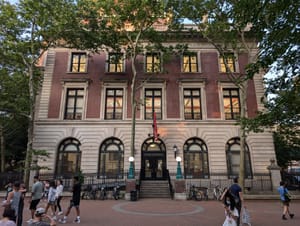An interesting short article about the University of Chicago building plans:
The poll of 5,700 students’ library usage habits on campus reveals the use of electronic resources is not crowding out use of libraries for research using conventional stacks, reference materials and other physical resources, as some have feared. [A new library survey supports expanding space for knowledge]
Oscar Wilde quipped that economists knew the price of everything but the value of nothing. (Update: oops … as a colleague points out, OW was talking about cynics. I knew this: I don’t know what this slip means 😉
I find that I am increasingly thinking of cost alongside value when thinking about library issues. In an environment of level funding, libraries will increasingly want to put their resources where they create most value. Of course, this then raises the question of how best to create value. What should the library of 2015 – of whatever type – be doing.
In that context, it would be interesting to know what the per-use cost of managing a book over time was. Acquisition costs, but then also costs of storage, shelving, air conditioning, and so on.
I wrote a first version of this while travelling. I returned home to find my November issue of Update (the UK equivalent of American Libraries) waiting for me. It carries a brief story about decisions that Oxford University is facing about storage.
The University now has more than 11m volumes, and needs three miles more shelving every year. [Oxford decision looms. Update, November 2005 Volume 4(11). p. 2]
Of course, these discussions are now common, and ‘systemwide’ approaches are being discussion within regional and national contexts. I expect that over the next few years, the costs of managing this distributed bookstock will bring about a much more coordinated approach to its collective management. The opportunity cost of not so doing is too great.
U Chicago link via the useful ACRLog.
Postscript: This entry is being revised on Saturday 12 November. I have not seen consistent blogging practice emerge for cases like this where you return to an entry and change it.



